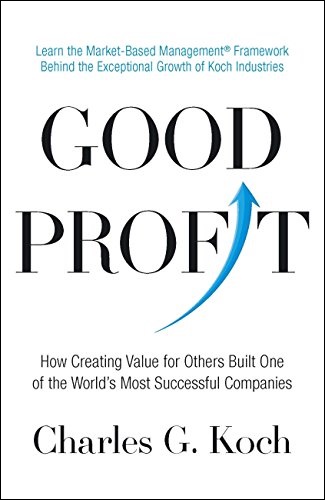Good Profit
How Creating Value for Others Built One of the World's Most Successful Companies


The author owns 42% of the second largest privately owned company in the USA, Koch Industries, his brother owns the other 42%. The Koch brothers are known for their support of right-wing, libertarian causes and have drawn ire from the left for environmental damage caused by their operations, while recognised for their support of free thinking and free markets.
The book is a personal manifesto around Koch Industries 'Market-Based Management' approach. MBM is, at root, an extension of the old philosophy argument personified by Locke and Rousseau vs Thomas Hobbes; are people generally good and community spirited, or mean and self-serving? Koch's approach is that left to our own devices (by which he means minimal government interference) people will seek out what is best for the wider eco-system they live in.
Lying at the heart of this book, and Koch's thinking, is Adam Smith's belief that individuals often best promote societal interests when they promote their own. Koch says "MBM emphasizes 'Principled Entrepreneurship' over corporate welfare, virtue over talent, challenge over hierarchy…and rewards for long-term value creation over managing to budgets". This should be music to most business school faculty ears – and is an approach only really available to companies not required to publish quarterly statements and having to keep the capital markets smiling. The issue is not whether individuals make the best choices for society, but whether markets can.
"Allowing people the freedom to pursue their own interests…is the best and only sustainable way to achieve societal progress" says Koch. He believes these principles apply as much to organizations as to society. In order to manage 'creative destruction', 'employees need to know what to do without being told'.
Koch reduces the complexity of MBM to five dimensions: Vision; Virtue and Talent; Knowledge Processes; Decision Rights; and Incentives. And it is in explaining these in more detail that is the book's core focus.
This is the paperback edition of the book originally published in 2015 and builds on the earlier book on MBM, The Science of Success.
There is much sense in this more devolved approach to management, and it chimes with plenty of other management approaches – such as David Marquet's Intent-Based Leadership (see podcast). What Koch is less clear about is how market forces can accelerate change which is not in the consumer's individual short-term interest, but in society's long-term interest. Climate change and income inequality being such examples.
Title: Good Profit: How Creating Value for Others Built One of the World's Most Successful Companies
Author/s Name/s: Charles G. Koch
Publisher: Piatkus – Penguin Random House
ISBN: 978-0-349-41606-9
Publishing Date: August 2017
Number of Pages: 260
Author Knowledge Rating: 1-5 (based on their years of experience, academic expertise in subject areas, and exposure to cross-functional thinking in the area)













































Readability: 1-5 score(1=dense and v academic; 5=frantic; page turner)
























































Appropriate Length: (1=could have been written in 25% of the length;5=could have been longer)






















































Core Idea Value: (1=nonsense (or entirely esoteric); 5=game-changer)























































